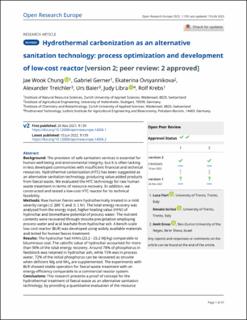Bitte benutzen Sie diese Kennung, um auf die Ressource zu verweisen:
https://doi.org/10.21256/zhaw-29511| Publikationstyp: | Beitrag in wissenschaftlicher Zeitschrift |
| Art der Begutachtung: | Open peer review |
| Titel: | Hydrothermal carbonization as an alternative sanitation technology : process optimization and development of low-cost reactor |
| Autor/-in: | Chung, Jae Wook Gerner, Gabriel Ovsyannikova, Ekaterina Treichler, Alexander Baier, Urs Libra, Judy Krebs, Rolf |
| et. al: | No |
| DOI: | 10.12688/openreseurope.14306.2 10.21256/zhaw-29511 |
| Erschienen in: | Open Research Europe |
| Band(Heft): | 1 |
| Heft: | 139 |
| Erscheinungsdatum: | 10-Jun-2022 |
| Verlag / Hrsg. Institution: | F1000 |
| ISSN: | 2732-5121 |
| Sprache: | Englisch |
| Schlagwörter: | Energy; Faecal sludge; Fertilizer; Hydrothermal carbonization; Nutrient; Resource recovery; Sanitation; Struvite |
| Fachgebiet (DDC): | 620: Ingenieurwesen |
| Zusammenfassung: | Background: The provision of safe sanitation services is essential for human well-being and environmental integrity, but it is often lacking in less developed communities with insufficient financial and technical resources. Hydrothermal carbonization (HTC) has been suggested as an alternative sanitation technology, producing value-added products from faecal waste. We evaluated the HTC technology for raw human waste treatment in terms of resource recovery. In addition, we constructed and tested a low-cost HTC reactor for its technical feasibility. Methods: Raw human faeces were hydrothermally treated in a mild severity range (≤ 200 °C and ≤ 1 hr). The total energy recovery was analysed from the energy input, higher heating value (HHV) of hydrochar and biomethane potential of process water. The nutrient contents were recovered through struvite precipitation employing process water and acid leachate from hydrochar ash. A bench-scale low-cost reactor (BLR) was developed using widely available materials and tested for human faeces treatment. Results: The hydrochar had HHVs (23.2 - 25.2 MJ/kg) comparable to bituminous coal. The calorific value of hydrochar accounted for more than 90% of the total energy recovery. Around 78% of phosphorus in feedstock was retained in hydrochar ash, while 15% was in process water. 72% of the initial phosphorus can be recovered as struvite when deficient Mg and NH 4 are supplemented. The experiments with BLR showed stable operation for faecal waste treatment with an energy efficiency comparable to a commercial reactor system. Conclusions: This research presents a proof of concept for the hydrothermal treatment of faecal waste as an alternative sanitation technology, by providing a quantitative evaluation of the resource recovery of energy and nutrients. The experiments with the BLR demonstrate the technical feasibility of the low-cost reactor and support its further development on a larger scale to reach practical implementation. |
| URI: | https://digitalcollection.zhaw.ch/handle/11475/29511 |
| Volltext Version: | Publizierte Version |
| Lizenz (gemäss Verlagsvertrag): | CC BY 4.0: Namensnennung 4.0 International |
| Departement: | Life Sciences und Facility Management |
| Organisationseinheit: | Institut für Chemie und Biotechnologie (ICBT) Institut für Umwelt und Natürliche Ressourcen (IUNR) |
| Enthalten in den Sammlungen: | Publikationen Life Sciences und Facility Management |
Dateien zu dieser Ressource:
| Datei | Beschreibung | Größe | Format | |
|---|---|---|---|---|
| 2022_Chung-etal_Hydrothermal-carbonization-alternative-sanitation-technology_v2.pdf | 4.26 MB | Adobe PDF |  Öffnen/Anzeigen |
Zur Langanzeige
Chung, J. W., Gerner, G., Ovsyannikova, E., Treichler, A., Baier, U., Libra, J., & Krebs, R. (2022). Hydrothermal carbonization as an alternative sanitation technology : process optimization and development of low-cost reactor. Open Research Europe, 1(139). https://doi.org/10.12688/openreseurope.14306.2
Chung, J.W. et al. (2022) ‘Hydrothermal carbonization as an alternative sanitation technology : process optimization and development of low-cost reactor’, Open Research Europe, 1(139). Available at: https://doi.org/10.12688/openreseurope.14306.2.
J. W. Chung et al., “Hydrothermal carbonization as an alternative sanitation technology : process optimization and development of low-cost reactor,” Open Research Europe, vol. 1, no. 139, Jun. 2022, doi: 10.12688/openreseurope.14306.2.
CHUNG, Jae Wook, Gabriel GERNER, Ekaterina OVSYANNIKOVA, Alexander TREICHLER, Urs BAIER, Judy LIBRA und Rolf KREBS, 2022. Hydrothermal carbonization as an alternative sanitation technology : process optimization and development of low-cost reactor. Open Research Europe. 10 Juni 2022. Bd. 1, Nr. 139. DOI 10.12688/openreseurope.14306.2
Chung, Jae Wook, Gabriel Gerner, Ekaterina Ovsyannikova, Alexander Treichler, Urs Baier, Judy Libra, and Rolf Krebs. 2022. “Hydrothermal Carbonization as an Alternative Sanitation Technology : Process Optimization and Development of Low-Cost Reactor.” Open Research Europe 1 (139). https://doi.org/10.12688/openreseurope.14306.2.
Chung, Jae Wook, et al. “Hydrothermal Carbonization as an Alternative Sanitation Technology : Process Optimization and Development of Low-Cost Reactor.” Open Research Europe, vol. 1, no. 139, June 2022, https://doi.org/10.12688/openreseurope.14306.2.
Alle Ressourcen in diesem Repository sind urheberrechtlich geschützt, soweit nicht anderweitig angezeigt.